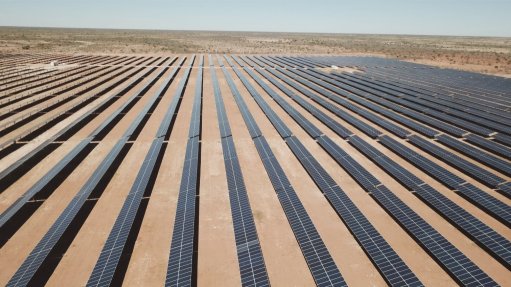Housing authority delivered 14 000 units in 2020, asks for budget reform
Social Housing Regulatory Authority (SHRA) council chairperson Bathabile Dlamini says the 2019/20 financial year had seen “encouraging” performance in that 13 projects were completed, delivering almost 14 000 units.
Although the target for the year was not met, it is a solid achievement, she adds. This while demand for social housing remains high at 320 000 units nationally.
Housing demand has, since 2016/17, remained at about 235 000 units in metropolitan municipalities and 83 000 units in district municipalities.
Since 2005, the social housing programme has delivered 135 projects, providing 33 241 units.
A further 38 projects are in progress, which will bring the total number of projects to 173, providing almost 53 000 units – the majority of planned projects are in Gauteng, followed by the Eastern Cape.
Dlamini comments in the ‘State of the Social Housing Sector’ report for 2019/20 that a growth plan formulated in the year provides strong direction for the way forward and for substantially increasing the number of units provided by the social housing sector.
The plan calls for revisions to policy and the funding framework, as well as for processes to administer social housing.
SHRA CEO Mpolai Nkopane says the growth plan is aligned with the Medium-Term Strategic Framework for 2019 to 2024, which calls for 30 000 housing units to be delivered.
“The SHRA has developed an ambitious social housing programme growth plan that will double the production rate for social housing in the 2020/21 to 2024/25 term compared with the 2015/16 to 2019/20 period and triple it in the 2025/26 to 2029/30 period, thereby adding a further 87 500 affordable rental housing units and growing the social housing portfolio in the country to 125 000 units,” she explains.
The growth plan further proposes progressive budget reform and that the established construction sector be pulled in through proactive invitations to participate in authentic empowerment deals.
“This is important because the established construction sector has valuable expertise and experience to support transformation, deliver at pace and create and maintain jobs,” Nkopane notes.
The growth plan framework proposes an approach where the National Housing Finance Corporation, the SHRA, the Housing Development Agency and others are components of a system and where targets and timeframes among public entities are mutually reinforcing.
Some of the plans include adjusting the Social Housing Policy, which is 15 years old, and the Social Housing Act, which is 12 years old, to speed up production through broader participation and more diverse unit types.
It is essential that the minimum 30 m2 unit size requirement be removed. The SHRA, together with the Department of Human Settlements, is reviewing these policies and will make recommendations to the Human Settlements Minister during 2020/21.
BUDGET REFORM
The SHRA notes that, during 2019/20, the human settlements budget for capital expenditure was reduced to R32.7-billion. Of this, only R723-million, or 2.2%, was allocated to social housing units.
The Human Settlements Development Grant budget soaked up the lion’s share of the capital budget, having been awarded R18.7-billion, or 57%, of the budget; and the Urban Settlement Development Grant budget was awarded R12-billion, or 36.7%, of the budget.
Given a housing backlog of 2.3-million units and social housing unit demand of 320 000 units, the social housing share of the capital budget should be about 14% - R4.5-billion in 2019/20 budgeting terms, the SHRA states.
At current cost and, excluding escalations linked to building inflation, 87 500 State-subsidised social housing units would require a grant injection of R23.7-billion.
This equates to 7.2% of the human settlements capital budget over the same period if the current year’s allocation of R32.7-billion is straight-lined.
Social housing is recognised as an important delivery mechanism as it provides affordable rental to low-income households and contributes to urban regeneration and the sustainability of local municipalities, concludes Nkopane.
Comments
Press Office
Announcements
What's On
Subscribe to improve your user experience...
Option 1 (equivalent of R125 a month):
Receive a weekly copy of Creamer Media's Engineering News & Mining Weekly magazine
(print copy for those in South Africa and e-magazine for those outside of South Africa)
Receive daily email newsletters
Access to full search results
Access archive of magazine back copies
Access to Projects in Progress
Access to ONE Research Report of your choice in PDF format
Option 2 (equivalent of R375 a month):
All benefits from Option 1
PLUS
Access to Creamer Media's Research Channel Africa for ALL Research Reports, in PDF format, on various industrial and mining sectors
including Electricity; Water; Energy Transition; Hydrogen; Roads, Rail and Ports; Coal; Gold; Platinum; Battery Metals; etc.
Already a subscriber?
Forgotten your password?
Receive weekly copy of Creamer Media's Engineering News & Mining Weekly magazine (print copy for those in South Africa and e-magazine for those outside of South Africa)
➕
Recieve daily email newsletters
➕
Access to full search results
➕
Access archive of magazine back copies
➕
Access to Projects in Progress
➕
Access to ONE Research Report of your choice in PDF format
RESEARCH CHANNEL AFRICA
R4500 (equivalent of R375 a month)
SUBSCRIBEAll benefits from Option 1
➕
Access to Creamer Media's Research Channel Africa for ALL Research Reports on various industrial and mining sectors, in PDF format, including on:
Electricity
➕
Water
➕
Energy Transition
➕
Hydrogen
➕
Roads, Rail and Ports
➕
Coal
➕
Gold
➕
Platinum
➕
Battery Metals
➕
etc.
Receive all benefits from Option 1 or Option 2 delivered to numerous people at your company
➕
Multiple User names and Passwords for simultaneous log-ins
➕
Intranet integration access to all in your organisation
















